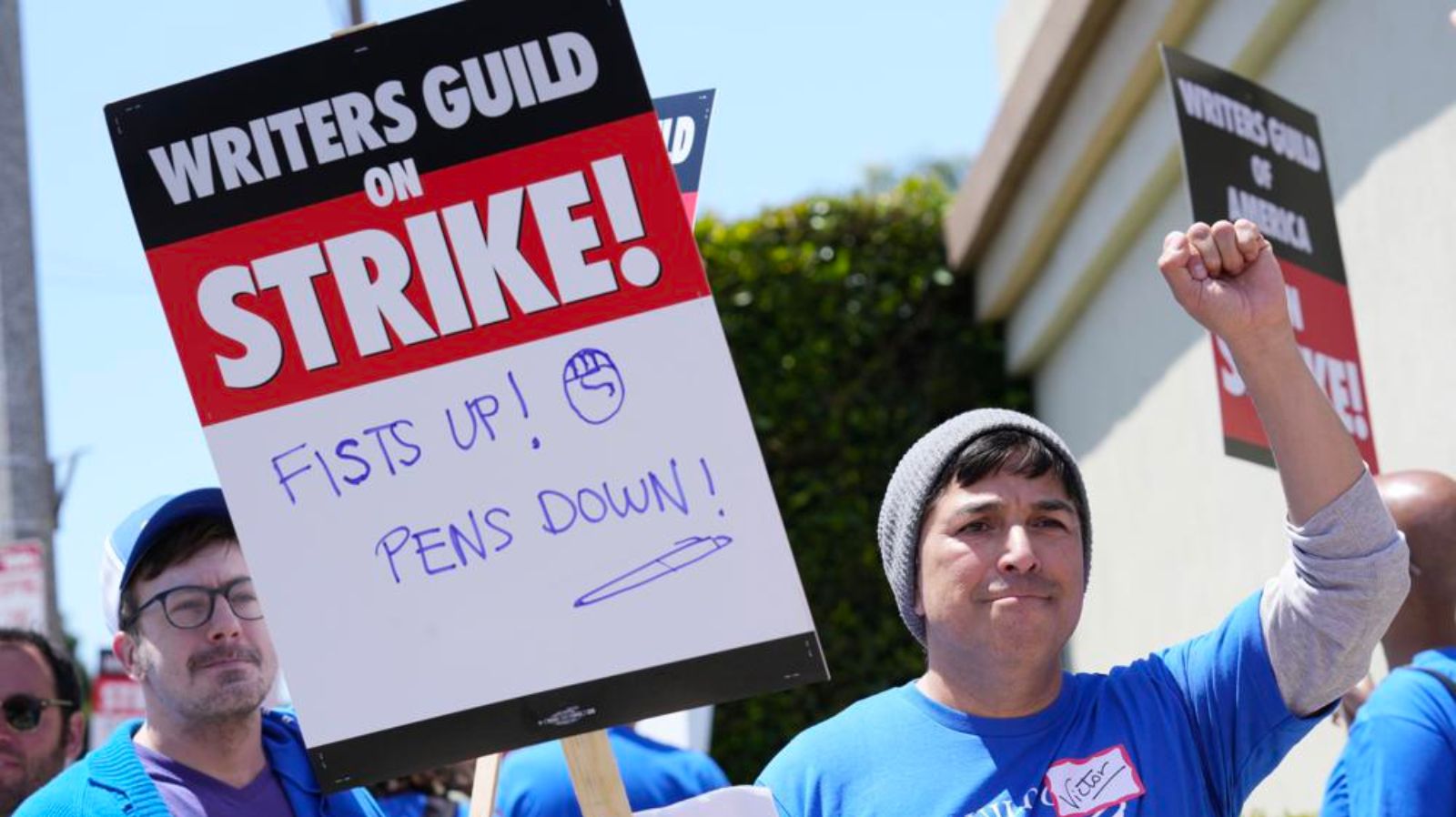- Item 1
- Item 2
- Item 3
- Item 4
Hollywood Writers on Strike Grapple with AI’s Role in Creative Process
As 12,000 Writers Guild of America members go on strike, their demands include setting boundaries on AI's involvement in screenwriting, signaling growing concerns over the technology's impact on creativity and their profession.

Striking WGA members demonstrating outside studio offices. Photo credit: AP
🧠 Stay Ahead of the Curve
As the Writers Guild of America (WGA) strikes, their demands include defining AI's role in the screenwriting process.
The strike’s demands underscore growing concerns over AI's impact on creativity and job security in the writing profession.
AI advancements have already impacted other creative fields, and Hollywood executives believe it could heavily influence the future of content.

May 02, 2023
Around 12,000 writers represented by the Writers Guild of America (WGA) have gone on strike, disrupting production of TV shows and movies until a deal is reached with studios. While most of their demands focus on improved pay and working conditions, one new issue has emerged: setting boundaries on AI's involvement in writers' rooms.
AI is already impacting creative professions
The rapid adoption of AI-powered chatbots like OpenAI's ChatGPT has given screenwriters cause for concern. OpenAI’s own researchers predict that 80% of the US workforce, including writers and lawyers, could be affected by chatbot technology.
AI’s impact has already manifested in China's videogame industry, where generative AI art tools have significantly altered artists' roles and reduced work by as much as 70%. Last month, an AI-generated photo won a prestigious photography competition, much to the surprise of judges who were unaware that the image was wholly generated by AI.
Even Hollywood's elite, such as Joe Russo, the filmmaker and producer behind Avengers: Infinity War and Avengers: Endgame, foresee a future where AI "engineers storytelling" in movies, potentially replacing human writers with AI-generated content:
So potentially, what you could do with it is obviously use it to engineer storytelling and change storytelling. So you have a constantly evolving story, either in a game or in a movie, or a TV show. You could walk into your house and save the AI on your streaming platform. “Hey, I want a movie starring my photoreal avatar and Marilyn Monroe's photoreal avatar. I want it to be a rom-com because I've had a rough day,” and it renders a very competent story with dialogue that mimics your voice. It mimics your voice, and suddenly now you have a rom-com starring you that's 90 minutes long. So you can curate your story specifically to you.
Evolving positions on AI highlight the dynamic environment
The WGA's evolving stance on AI guardrails during negotiations reflects the industry's ongoing struggle with the impact of AI on the writing profession. Initially, the WGA sought to regulate the use of AI in the writing process, prompting some to believe that AI tools would be entirely banned from writers' rooms.
But pushed for further clarification, the WGA evolved its position and explained that it was actually open to AI tools, so long as it did not impact writers’ credits or residuals. Regarding AI tools, WGA clarified its primary objective. “Companies can’t use AI to undermine writers’ working standards including compensation, residuals, separated rights and credits,” the union declared.
AI can be used as a supplementary tool, but should replace work covered by the Minimum Basic Agreement, the collective bargaining agreement between the WGA and studios, the union said. “AI can’t be used as source material, to create MBA-covered writing or rewrite MBA-covered work, and AI-generated text cannot be considered in determining writing credits,” the WGA explained in its position on AI.
The WGA stated its belief that “AI software does not create anything. It generates a regurgitation of what it's fed,” therefore making it comparable to reference material, like a Wikipedia article, but unable to have any claim of authorship like a human could. “Its output is not eligible for copyright protection, nor can an AI software program sign a certificate of authorship,” said the WGA.
Screenwriters under pressure from multiple angles
These AI-related demands come at a time when screenwriters face challenges due to the rise of streaming companies. Syndication, and its residual income, has declined in the streaming era, and the rapid influx of new streaming content has led to smaller writers' rooms and decreased pay. AI advancements threaten to exacerbate these issues.
The future of AI may arrive sooner than screenwriters prefer. Asked in an interview how soon he thought AI-powered movies would come, Joe Russo gave a confident prediction: “Two years."
Research
In Largest-Ever Turing Test, 1.5 Million Humans Guess Little Better Than ChanceJune 09, 2023
News
Leaked Google Memo Claiming “We Have No Moat, and Neither Does OpenAI” Shakes the AI WorldMay 05, 2023
Research
GPT AI Enables Scientists to Passively Decode Thoughts in Groundbreaking StudyMay 01, 2023
Research
GPT-4 Outperforms Elite Crowdworkers, Saving Researchers $500,000 and 20,000 hoursApril 11, 2023
Research
Generative Agents: Stanford's Groundbreaking AI Study Simulates Authentic Human BehaviorApril 10, 2023
Culture
As Online Users Increasingly Jailbreak ChatGPT in Creative Ways, Risks Abound for OpenAIMarch 27, 2023
